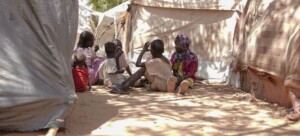At least 20 new cholera cases in Sudan’s White Nile
Cholera continues to claim more lives in White Nile state. Yesterday, two deaths were reported, in addition to the escalation of infections to a total 20 cases.
Cholera continues to claim more lives in White Nile state. Yesterday, two deaths were reported, in addition to the escalation of infections to a total 20 cases.
One person died of cholera in Sheikan village and another died in El Tamrin, journalist El Tahir Ishag told Radio Dabanga. Health centres in both villages witnessed ten new infected cases each. El Tamrin's new patients were transferred to El Gezira Aba medical isolation centre.
Abdelrahman El Siddig, the head of the White Nile civil society organisations, told Radio Dabanga last Sunday that a cholera patient died in El Gezira Aba’s Berono district on Friday.
He said that “dozens of new cases” were recorded in various villages in El Gezira Aba, as well as in Kosti and Rabak. According to the activist, the health authorities are refusing to disclose the number of dead and actual infections in the state.
Journalist Ishag added that it is difficult to obtain precise information about the number of afflicted people and deaths in remote villages. He attributed the spread to unsafe drinking water from the White Nile. “Most people in the area are relying on water from the Nile brought to them by tankers and donkey carts.”
Ishag called on the Sudanese government to recognise the disease “as recognition is the first step of treatment, and allows regional and international organisations to pintervene as well, and help eradicating the disease”.
'Infections drop'
In early May, the Sudanese Health Minister, Bahar Abu Garda, announced a drop in the number of cholera cases in White Nile state, following chlorination of the drinking water. Four people, however, died from cholera in two days' time last week in White Nile state.
The deadly disease spread to other localities in eastern, central, and northern Sudan from September last year. The Health Ministry reported in late January that more than 300 patients were recorded in El Gedaref, Red Sea, and Khartoum states. But the federal health authorities continue to deny the presence of cholera. The ministry acknowledged a “watery diarrhoea epidemic” in eastern Sudan and Khartoum early this year.











 and then
and then